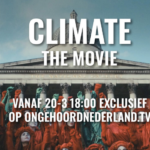
I as a blogger of Climategate carry a worse case of 'Not-believe-The-Expertitis' and Denial Disorder
This week I, Marcel and several others in the skeptosphere received a proposal to cooperate on research by sociologists of the University of Nottingham and the Vrije Universiteit:
I am a postdoctoral researcher in the Faculty of Social Sciences at the VU University Amsterdam. I received your name from Pier Vellinga who suggested that you would be a good person to speak to about climate change in the Netherlands.
Climate change is socially complex but we already know the answer
It is about ‘studying climate change as a socially complex issue’. Now the CLimate Change department of the Sociology Group of the University of Nottingham launched this website ‘Talking Climate.org‘, which is a classical piece of ‘how to pour The Message in the heads of the Unwilling’ and to cure those suffering from ‘denial disorder’. It states:
The evidence for climate change is so overwhelming (…)that you might expect the facts to speak for themselves. Unfortunately they don’t – which means that using the most effective methods for communicating climate science is critical.
Now the researcher stated she was new to the climate-field. So forgive her. But to my opinion this hardly is a starting point to objective research, but the typical value-laden pseudoscience that typifies the Climatists: the large body of ‘experts’ circling around the small group of actual true climate scientists who gather data and test hypotheses.
The climatists are the large body that have forced true scientists to overstate certainties in predictions on their soft branch of science and contributed to politization. The study of an open system with multiple variables acting upon eachother at the same time, does per definition not lend itself for overcertain claims about ‘overwhelming evidence’.
Those overcertain claims are needed if one wants to enforce climate-onlye-policies that people would normally discard as uneconomic. However, the questions that I asked to send in advance are not of the worst kind. I invite everyone here on Climategate to formulate their own answerto the questions
I want to interview you because I see you as a key stakeholder of the climate change debate in the Netherlands. I will interview key people from climate research, policy, media, and activist groups in the Netherlands. The outcome of my research will be a nuanced description of climate change (as a debated issue) in the Netherlands. Specifically, the data I collect will serve as a case study which I will use to contribute to organizational communication research on processes of stakeholder communication.
Here is a list of questions I wanted to ask you:
How do you define or perceive climate change?
Other people refer to you as a climate change skeptic. How do you define yourself, in terms of your stance on climate change?
What is the most pressing issue or problem currently climate change [skeptics] are trying to address?
What kinds of actions does that require? Who is involved in that action?
What aspects of the climate change debate do climate change [skeptics] most overlook?
Why are these aspects overlooked?What do you do to influence/cooperate with policy makers? What have been some of the challenges in this influence/cooperation?
What do you do to influence/ cooperate with climate scientists? What have been some of the challenges in this influence/cooperation?
What do you do to influence/ cooperate with climate activists or NGO’s? What have been some of the challenges in this influence/cooperation?Who are the main audiences or stakeholders of your work?
How do you communicate to those audience or stakeholders?What past events do you think have significantly impacted the climate change debate today?
What events occurring in the world today worry you, in terms of shaping the climate change debate?
What future events occurring in the world do you foresee having an impact on the future of the climate change debate?How does the national culture of the Netherlands influence how climate change is responded to?
How is the geography of the Netherlands influence how climate change is responded to?
How are people in the Netherlands affected by climate change?
How do you think the general public in the Netherlands perceives climate change? Why?
What do you hope the Netherlands does in the future to address climate change?Could you recommend anyone else that we should also interview?
I will give a five-blog answer that summarizes my position, and why i believe ‘climate change’is not about climate but risk perception.
The first blog will be a summary of my position. The second part will be on the role of common sense, the third part on cultural and financial pollution of current science practice. And the last part will be about the blind spot among some scientists for their own political preconceptions, so that unjustly the climate debate is framed as a science versus nonscience issue, while actually we see a clash of worldviews dressed up as a science-debate. To those familiar with the creationism-evolution-struggle this is familiar terrain.
Finally I will decribe the case Pier Vellinga, to personalize my theory on the role of post-Protestant Iconoclasts of the protestgeneration ’68 in popularizing all kinds of unfalsifiable sciences based on (closed) systemsthinking, to enforce a childish (no financial accountability) ‘give everything to the poor’-agenda, also known as Agenda 21, mostly by inflating the importance of risks in the environmental arena for the daily life of Western Civilians.
For the research of Amanda Porter: I wish her good luck and hope she brings a fresh approach to the debate.






Inderdaad het klimaatalarmisme en de gekoppelde duurzaam-hype is vooral een sociologisch-psychologisch verklaarbaar fenomeen. De sociologisch-psychologisch bewijzen daarvoor zullen overwhelming blijken. Klimaatwetenschappelijk hebben de klimaatalarmisten en duurzaamheidscult weinig meer bij te dragen.
Wat mij betreft heeft het te maken met een overkill aan voor-niets-goeds-opgeleiden en het toestaan van een onbeperkt gesubsidieerd verblijf in de vele denktorens van de overheid.
Daar worden problemen aangedikt of compleet verzonnen onder het mom van maatschappelijk belang.
Dit soort denktorens is een autonoom leven gaan lijden.
Rypke,
Toe nou; dit is een grap? Toch?
http://www.youtube.com/watch?v=LAC-krypsng
Ik vraag me werkelijk af of je hier wel aan moet mee werken. Je wordt aangedragen als ‘geval’ N.B. door Pier Vellinga!
Laat dat luie tutje jouw website en de stukken hier op climategate maar lezen. Daar worden alle vragen tot diep na de komma beantwoord.
Waarom redelijkheid betrachten en meewerken aan wat deze lieden eigenlijk willen.
Zo wil men graag hebben:
– harde autoritaire leiding om de klimaatdoelstellingen te halen, zie Jørgen Randers
– en met kritiek wordt dan als volgt omgegaan, zie dit filmpje na ca. 14.00 – 15.30 minuten (let op de dokter met het spuitje):
http://www.youtube.com/watch?v=4Rjii6-XtMc
Zo, zo, nu ook een sociologisch onderzoek. Dan ben je nog wel even bezig…..
– could you recommend anyone else…….
Ik ben heel benieuwd wie er allemaal zo’n brief hebben gekregen? En wie niet, natuurlijk. Staat b.v. collega Bas van Geel op de verlanglijst?
Ik begrijp dat woord stakeholder ook niet zo goed. Of wel … dat zegt iets over de ‘wetenschappelijk’ betrokkenen onder de AGW protagonisten.
Dit is toch wel het betere sloopwerk. Het slopen van de wetenschap uit naam van de wetenschap. Wat een armetierige vertoning trouwens zeg, bij de UVA: geeneens een eigen vakgroep ‘klimaatpraat faculteit sociologie’ noch kekke webzijde.
Vriendelijke dag nog verder,
DWK
steak holder (vom Eifeler Rind)
Volgens mij is dit de eerste keer dat ik het eens ben met Rypke. De openingszin The evidence for climate change is so overwhelming… slaat de plak mis en is een compleet verkeerde aanpak voor een communicatie strategie. ook over de risico benadering ben ik helemaal eens. ik ben het waarschijnlijk niet eens me rypke hoeveel risico klimaatverandering met zich meebrengt… maar dat komt later.
ik hoop wel dat de sociale wetenschapper met een mooi psychologisch rapport komen van Rypke wat zijn woede en frustatie naar alles wat naar groen en duurzaam ruikt verklaart.
Woede en frustratie over groen en duurzaam is goed te begrijpen als je kijkt naar de motieven en wat het opgeleverd heeft.
Biobrandstof, biovergassing, wind- en zonne-energie inpassen in het bestaande netwerk zijn uiterst kostbare en mislukte initiatieven.
Het idee van mitigatie was al direct om zeep geholpen toen de landen-in-ontwikkeling aju-paraplu riepen.
Wat mij betreft kan de sociologie beter onderzoek doen naar de oorzaken waarom de groenezijde er wereld- en mensvervremende ideeën op na houdt.
Kameraad Martijn Jansen: je past een wat lage debattruc toe, door mijn onderbouwde kritiek af te schuiven als 'woede en frustratie' (= hij is niet helemaal goed bij zijn hoofd en heeft begrip nodig, dank je)op basis van verschil in smaak over 'stijl' om het inhoudelijk te kunnen omzeilen, na jezelf eerst te portretteren als iemand die begrip heeft en alles overziet
Je hebt gewoon andere ethische opvattingen dan ik blijkbaar. Ik vind die van mij beter
Dikke kans dat je urbaan, progressief en seculier bent.
Kameraad Jansen heeft last van pseudo-geloofsbelijdenis: geloven in iets goeds omdat de wereld daar beter van wordt. En daarbij vooral ontkennen dat je op basis van religieuze aspiraties handelt, want anders zou je levensnaïviteit wel eens kunnen blijken.
Liever die cognitieve dissonantie maar meteen opheffen, tegen elke prijs.